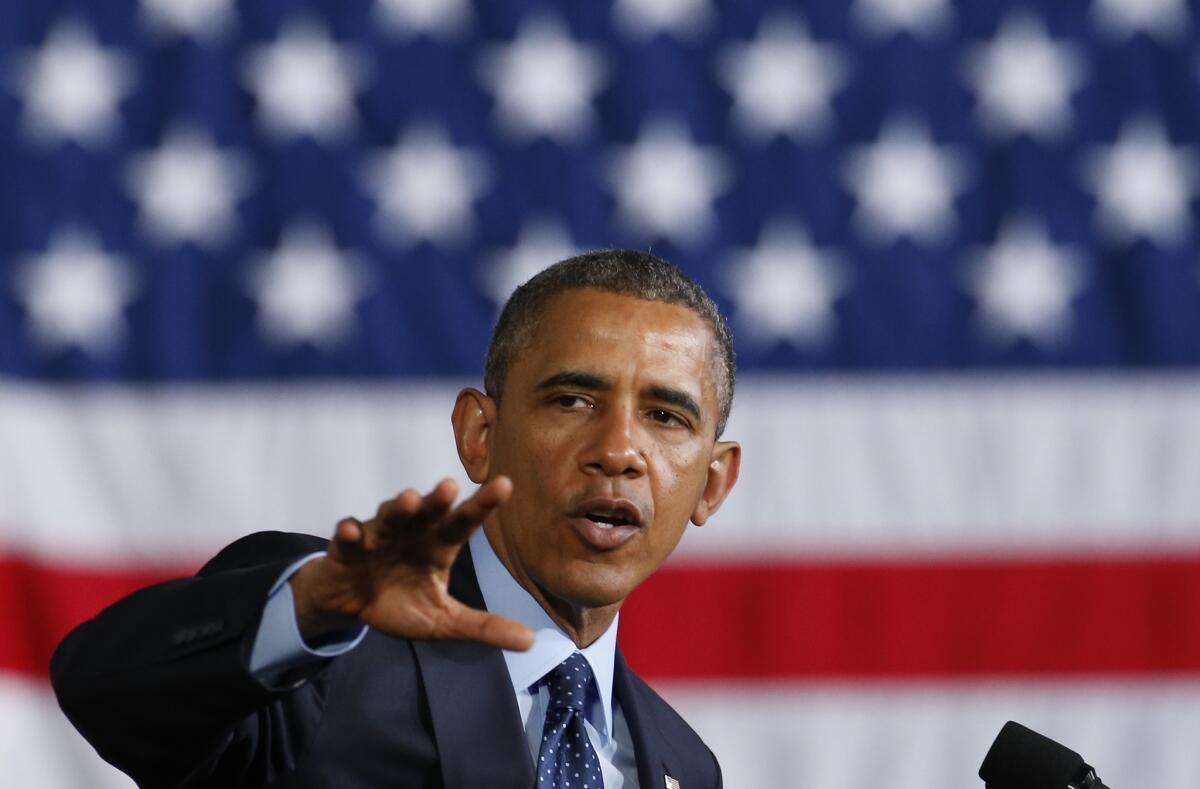U.S., allies to add sanctions against Russia over Ukraine

- Share via
Reporting from Seoul — The White House said Saturday that the world’s leading industrialized nations had agreed to impose targeted sanctions on Russia as early as Monday in response to its actions toward neighboring Ukraine.
“Leaders have agreed that there must be further sanctions on Russia for their actions,” a senior Obama administration official said. “Each country will determine which targeted sanctions they will impose. These sanctions will be coordinated and complementary, but not necessarily identical.”
The development follows what the administration believes are Russian efforts to destabilize eastern Ukraine, where pro-Russia separatists have seized government buildings.
After arriving in South Korea on Friday, Obama told reporters it was self-evident that sanctions so far hadn’t deterred Russian President Vladimir Putin from meddling in the affairs of Ukraine.
But Obama also argued that the increasing pressure of sanctions might yet have the intended effect. The U.S. and its European allies want Russia to use its influence with separatists to de-escalate the crisis.
Obama spoke late Friday with European counterparts, seeking their agreement on additional sanctions. An advisor to the president said the countries could announce their specific plans as early as Monday.
“President Putin is not a stupid man,” Obama said, adding that he thought the Russian leader would eventually respond to economic pressure.
The White House described the new sanctions as targeted, suggesting they won’t be the sweeping “sector” sanctions most likely to take a significant bite out of the Russian economy.
Senior officials have said the goal is to target Putin’s inner circle and the oligarchs on whom he relies for support, in the hope they might pressure Putin to change course. The administration says it is reserving the broader penalties to deter Putin from a full-scale invasion of Ukraine.
A statement from the Group of 7 nations -- Britain, Canada, France, Germany, Italy, Japan and the U.S. -- said Russia “has continued to escalate tensions by increasingly concerning rhetoric and ongoing threatening military maneuvers on Ukraine’s border.”
“We reiterate our strong condemnation of Russia’s illegal attempt to annex Crimea and Sevastopol, which we do not recognize,” the statement said.
“We have now agreed that we will move swiftly to impose additional sanctions on Russia,” it said. “Given the urgency of securing the opportunity for a successful and peaceful democratic vote next month in Ukraine’s presidential elections, we have committed to act urgently to intensify targeted sanctions and measures to increase the costs of Russia’s actions.”
The new round of sanctions comes as the Ukrainian government has responded to rising tension in the country’s east, moving against pro-Russia separatists who have seized government buildings. Russia, meanwhile, has massed troops near the border and held military exercises there.
Russian leaders and the separatists in eastern Ukraine have refused to abide by an agreement reached last week in Geneva that would require all illegally armed groups to surrender their weapons in exchange for a limited amnesty.
As part of that accord, Russia said it would publicly urge separatist forces to stand down. It also promised to allow international monitors in Ukraine and express support for the election next month.
But 13 international monitors from the Organization for Security and Cooperation in Europe have been detained by separatist gunmen occupying the volatile eastern city of Slovyansk.
The German-led team was on a mission to evaluate a potential security threat and was operating under a treaty provision known as the Vienna Document, which obliges the OSCE’s 57 member states to “consult and cooperate in case of unusual military activity or increasing tensions.”
Twitter: @khennessey
Twitter: @cparsons
Hennessey reported from Washington and Parsons from Seoul.
More to Read
Sign up for Essential California
The most important California stories and recommendations in your inbox every morning.
You may occasionally receive promotional content from the Los Angeles Times.











